“Contrary to what we, the people, have been told, we are the power; we have supreme authority because we are the masses and true power always resides with the masses, never with the global elite who, by their very nature, have always been a vulnerable minority and will always continue to be…As long as the masses realize that, of course.” – James Morcan
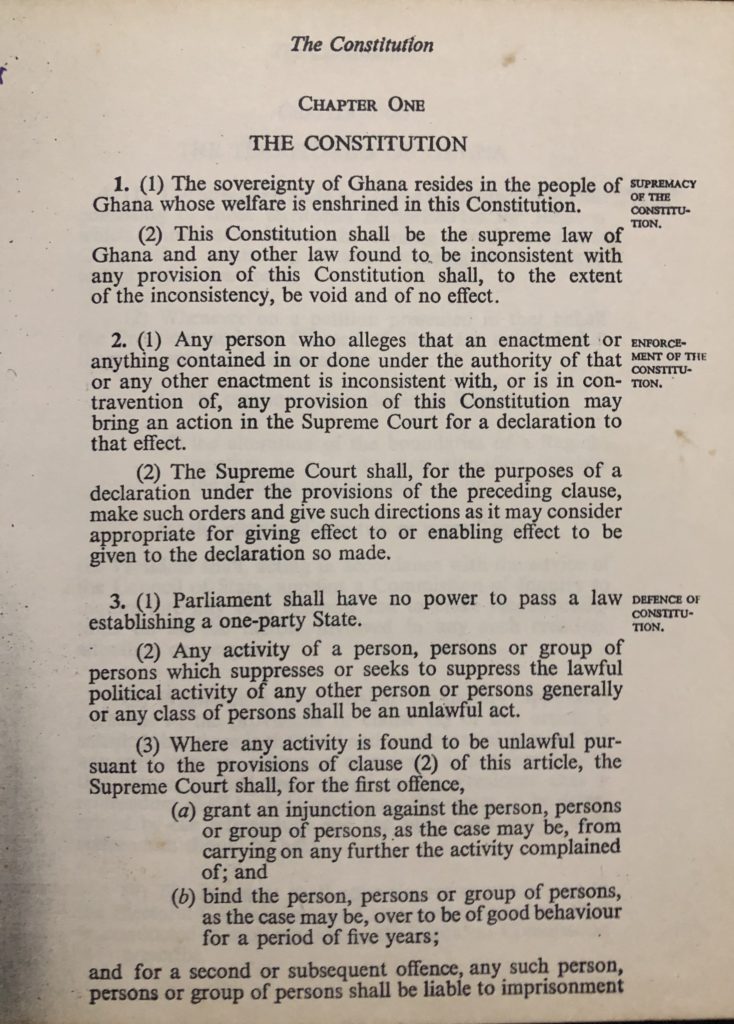
The 2nd Republican Constitution promulgated in August 1969, was premised on the need to ensure that no form of tyranny (properly so called) could ever rear its head in the nation’s politics. The Constitution that was drafted by the Constituent Assembly was therefore done in a manner as was to underpin some principles as was enshrined in the Preamble.
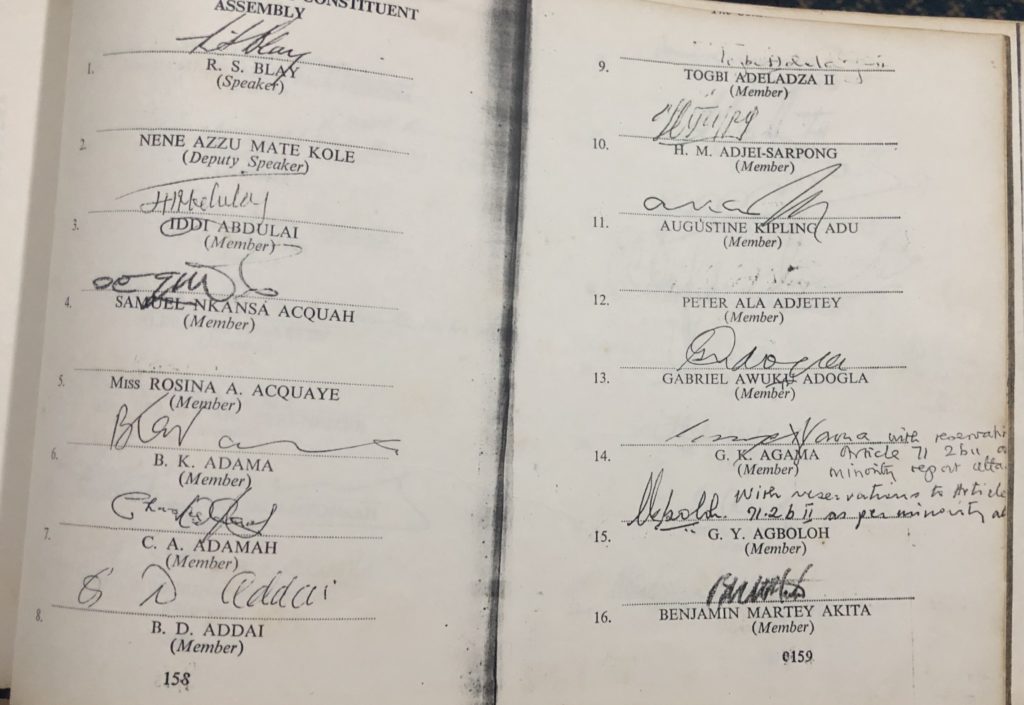
It began, “In the name of Almighty God from whom all authority is derived and to whom all actions both of men and States must be referred, WE THE CHIEFS AND PEOPLE OF GHANA, having experienced a regime of tyranny; Remembering with gratitude the heroic struggle against oppression; Having solemnly resolved never again to allow ourselves to be subjected to a like regime; Determined to secure for all of us a Constitution which shall establish the SOVEREIGNTY OF THE PEOPLE and the RULE OF LAW as the foundation of our society and which shall guarantee FREEDOM of thought, expression and religion; JUSTICE – social, economic and political; RESPECT for the dignity of the individual; and EQUALITY of opportunity DO HEREBY …..”.
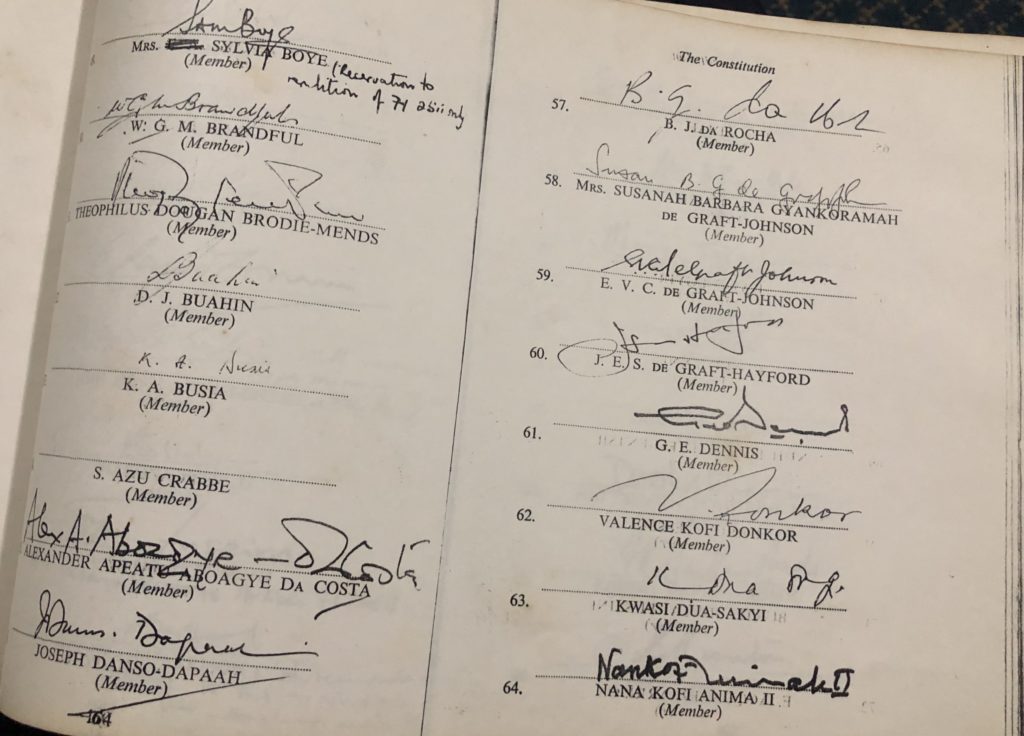
Speaking during his inauguration on 1st October 1969, the Prime Minister, Dr. Kofi Abrefa Busia declared, “Power is good or evil according to the vision that it serves. Our vision is that of a democratic welfare society in which everyone is his brother’s keeper. We consider that an important function of the democracy we will endeavour to establish here in our country will be to enlarge our sympathies one for the other, and make our souls more roomy so that our loyalties to our families, tribes, political parties do not divide us as a nation, but rather provide the foundation for the extension of the brotherhood of family or tribe to the wider brotherhood of the nation”. Whether the government was going to live to that billing or not was left to posterity to determine.
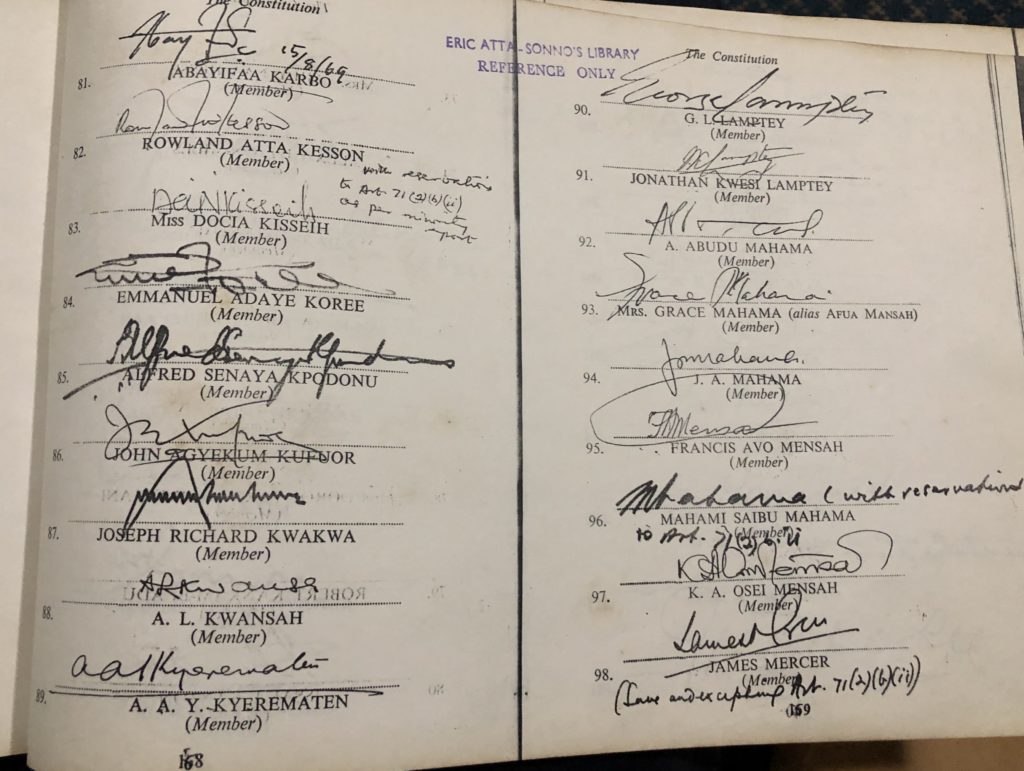
If the case of E. K. Sallah is anything to go by, then the exercise of executive powers conferred on the government of the Progress Party was something to be looked at. In 1970, the government had legislated that all public sector workers of a certain category were to re-apply in line with its interpretation of the Constitution. A total of 568 employees lost their jobs in the process but one of them, E.K. Sallah, a Manager with the GNTC was not to take this lying down. He took on the government at the Supreme Court and had a landmark ruling going in his favour. That very evening, the Prime Minister was on air to ‘retry’ the case through a live national broadcast via radio and television. Among several arguments he advanced, Dr. Abrefa Busia said that, “If any others who were not re-appointed in the recent implementation of the Transitional Provisions of the Constitution wish to sue the Government, they are at liberty to do so. The Government will not stop them. But if they hope thereby to coerce the Government to employ them, they will be wasting their time and money. My Government will exercise its rights to employ only those whom it wishes to employ. NO COURT can enforce any decision that seeks to compel the Government to employ or re-employ anyone. That will be a futile exercise. I wish to make that perfectly clear”.
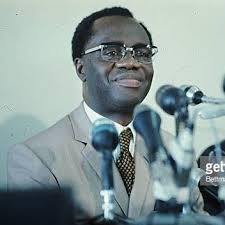 Another incident happened in 1971 when the Progress Party government was attempting to improve the operating conditions at the Makola Market with the provision of toilet facilities and lighting. The government thus requested the traders to close early so the works could be undertaken. The traders, for whatever reason chose to prove difficult and rather hurled insults on their Prime Minister. In a speech delivered in September 1971, Dr. Busia responded to the traders and among others said, “There is another reason why I feel sorry for them. The reason is this: Whether you like it or not, in this year of our Lord, 1971, the Head of Government – the Prime Minister of this country is Kofi Busia, whether you like it or not. At the present time, any country that wants to talk to us, anybody who comes to this country and wants to see the man who is ruling the country, will come to Kofi Busia”.
Another incident happened in 1971 when the Progress Party government was attempting to improve the operating conditions at the Makola Market with the provision of toilet facilities and lighting. The government thus requested the traders to close early so the works could be undertaken. The traders, for whatever reason chose to prove difficult and rather hurled insults on their Prime Minister. In a speech delivered in September 1971, Dr. Busia responded to the traders and among others said, “There is another reason why I feel sorry for them. The reason is this: Whether you like it or not, in this year of our Lord, 1971, the Head of Government – the Prime Minister of this country is Kofi Busia, whether you like it or not. At the present time, any country that wants to talk to us, anybody who comes to this country and wants to see the man who is ruling the country, will come to Kofi Busia”.
My dear friend, as though we had not had enough, the 3rd Republican Constitution of 1979 also came with the following preamble, “In the name of the Almighty God, We the People of Ghana, IN EXERCISE of our natural and inalienable right to establish a framework of government which shall secure for ourselves and our posterity the blessings of liberty and prosperity; IN A SPIRIT of friendship and peace with all peoples of the world; AND IN SOLEMN declaration and affirmation of our Faith in Freedom and Justice, The Principle that all powers of Government spring from the Sovereign Will of the People, The principle of Universal Adult Suffrage without any distinction whatsoever, The Rule of Law, The protection and preservation of Fundamental Human Rights, Unity and Stability for our Nation do herby…”. Unfortunately, the Limann regime was so short lived that it will be a bit difficult to match the government to these principles.

Interestingly, the PNDC government that overthrew Dr. Hilla Limann’s government claimed to be a people’s government. As though to remind itself of this, everything was tagged with ‘people’ – People’s Defence Committees, Citizens Vetting Committees, People’s Tribunals, etc. For the first time in decades, a section of the ordinary Ghanaian felt extremely empowered as they were drafted on Boards, Committees, etc. It was indeed the people’s time, but this was however not to last. The people’s revolutionary government grew to imbibe the trappings of power and by the time, it faded into the 4th Republic in 1993, it had probably become more aristocratic than the ones they came to replace in December 1981.
Since the coming into force of the 1992 Constitution, all our governments have operated under the 4th Republican Constitution whose preamble is as follows: “IN THE NAME OF THE ALMIGHTY GOD; We the People of Ghana; IN EXERCISE of our natural and inalienable right to establish a framework of government which shall secure for ourselves and posterity the blessings of liberty, equality of opportunity and prosperity; IN A SPIRIT of friendship and peace with all peoples of the world; AND IN SOLEMN declaration and affirmation of our commitment to; Freedom, Justice, Probity and Accountability; The Principle that all powers of Government spring from the Sovereign Will of the People; The Principle of Universal Adult Suffrage; The Rule of Law; The protection and preservation of Fundamental Human Rights and Freedoms, Unity and Stability for our Nation; DO HEREBY ADOPT, ENACT AND GIVE TO OURSELVES THIS CONSTITUTION.
Immediately following the Preamble is Article 1(1) which states among others, that, “The Sovereignty of Ghana resides in the people of Ghana in whose name and for whose welfare the powers of government are to be exercised in the manner and within the limits laid down in this Constitution”.
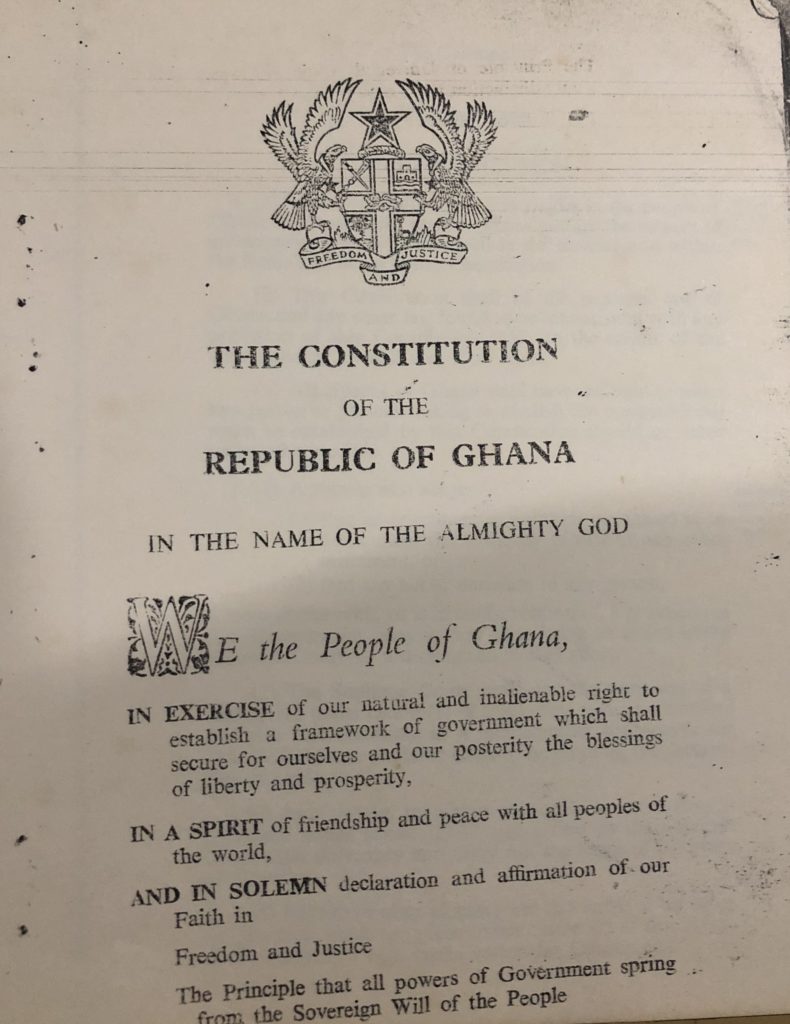
So why would we the people, give our power to an elected government to seek our utmost prosperity and yet, constantly end up having governments that only seek none other than the welfare of itself, appointees and party apparatchiks. Often time, when the people realize that they are being shortchanged and want to serve notice to enable their elected government to re-align, they are met with stiff opposition and sometimes abuse of State power all to send a lesson that, “Hey, we are in charge!”.
In 1995, the people, ostensibly fed-up with the high cost of living in Ghana took advantage of the imposition of the Value-Added Tax (VAT) on items to demonstrate their anger in a demonstration dubbed Kume-Preko (Just kill me). Ironically, they were met with brute force leading to death of an innocent young boy. The government eventually succumbed and withdrew the tax, only to re-introduce it a few months thereafter in much more humane fashion and rate. Many more demonstrations of the kind followed across the country for different reasons – Sieme-Preko (Just bury me), Wieme-Preko (Just finish me), etc. During the reins of the John Kufuor government, students also suffered brutalities during a demonstration in April 2007 when an overzealous Police Officer instructed his men to fire ammunition into the crowd of students. A similar thing had happened much earlier in 2001 when Polytechnic students were demonstrating against the non-recognition of their Higher National Diplomas. They had been denied access to the Castle to present their petition, and in the ensuing row had gotten a number of them chased, beaten and shot at. Under the NDC governance led by President John Mahama, other people-led demonstrations that have happened included the AFAG ‘Aagbe-Wo’ (They are killing us) demonstration of 2014 and the ‘Occupy Flagstaff House’ demonstration in July 2014 by Occupy Ghana.
During a recent demonstration by a group, when they had been denied access to the Jubilee House to present their petition, one of the leaders made a striking remark on radio, “So they came for our vote so they could make our lives better. To be able to have the peace of mind to work, we gave them a big mansion to work from. Now we want to see them and tell them our problems and we are being told that the place is so sacred and hallowed that we are not fit to go in there. But were we fit to elect them in the first place?”

On every election eve, we the people queue from midnight through the cold weathers of the night as well as the scorching heat of the day just to cast our ballots for our kith-and-kin to thrust them into various positions of trust. Beyond casting the ballot, the people stand around to ‘police’ the ballot until evening when it is counted and results declared. We then join them to celebrate the night away and help them transition into their new roles.
They have now become ‘His Excellencies’ and ‘Honourables’ and all of a sudden, everything about them would have transmogrified from one degree of glory to quantum notches higher. An appointment is now required to enter the house which hitherto was like a second home for many. This reminds me of a former teacher in my College I met in town sometime back. Unknown to me, he had been appointed a Headmaster of his alma mater. After chatting for a while, I promised him a visit the next time I was in tow. He quickly remarked that he was now a Headmaster and that I should not visit but pay a courtesy call. As to the difference between a visit and a courtesy call, I am yet to know but I got the message. Visits to big men are certainly different and this headmaster had certainly picked some lessons from his political big men.
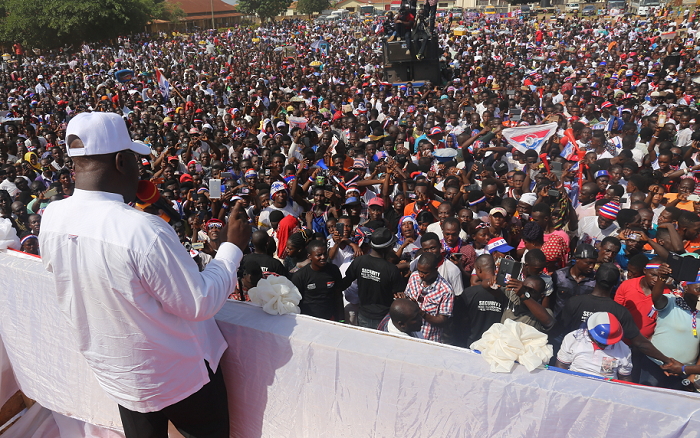
Is it any surprising that many young people these days opt for partisan politics as a career with some even getting themselves initiated through the various campus chapters – TESCON, TEIN, TESCHART, etc. Upon graduation, they quickly gravitate towards their various party offices working their way through communication bureaus, foot-soldiering in varied ways. In no time, they blossom into your next MMDCE, some ministerial spokesperson or better still your Member of Parliament. Is this sustainable? I don’t know, but time will surely tell!
Clearly, the increasing complexities in the architecture of our political governance has pushed the plight of WE THE PEOPLE into a pale shadow of the initial intentions. If care is not taken to re-position the people at the heart of national governance, the nation State stands the risk of gliding itself towards a situation that will render the entire governance framework completely untenable.
A stitch in time, we are told, saves nine!
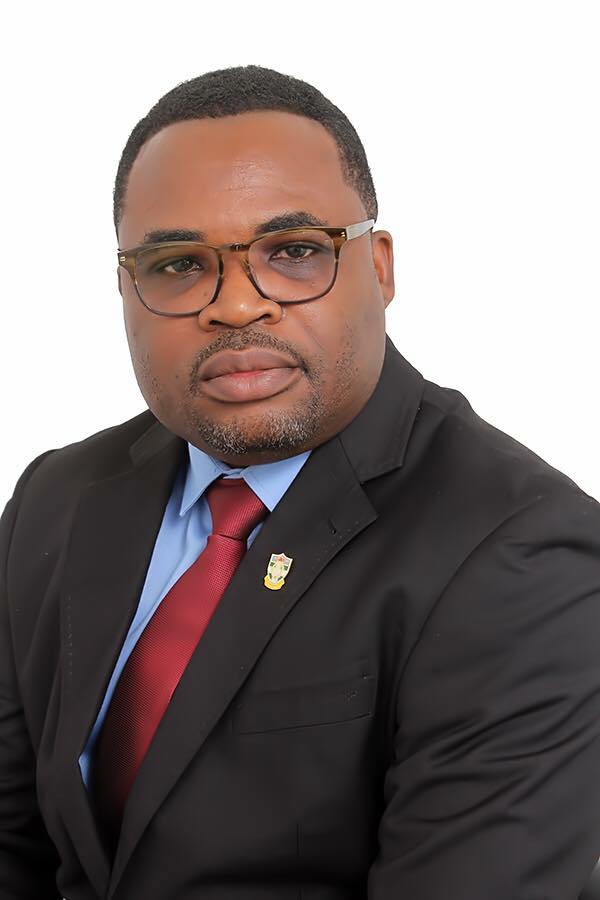
My dear friend,

Trackbacks/Pingbacks